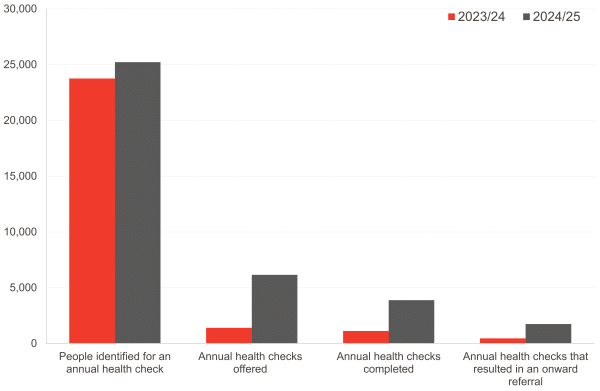Earlier this year, we highlighted the first release of Scottish Government data on Annual Health Checks. The second release, published in late August, offers a slightly more detailed picture of delivery across Scotland, now broken down by NHS Board. While some headway has been made, many questions remain.
The publication notes that 2024/25 is the second year of reporting, with Boards at varying stages of implementation and many not yet operating at full capacity. The method of identifying eligible individuals varies across Boards, capturing only people with learning disabilities known to Primary Care or Social Care services.
The latest figures show some improvement from a very low base: in 2024/25, 24% of identified adults (16+) were offered an annual health check, up from just 6% in 2023/24. Of those offered a check, 63% were completed in 2024/25 (down from 80% in 2023/24 when a lot less were offered), and 45% of completed checks resulted in onward referrals, a slight increase from 41% the previous year.
Overall, while the proportion of checks offered has increased, it remains under a quarter of eligible adults, highlighting the ongoing challenge. Progress has therefore been limited, especially given that the policy in Scotland aims to offer a health check to all eligible adults.
Figure 1. Scottish Annual Health Checks for People 16+ with Learning Disabilities 2023/24 – 2024/25
Source: Scottish Government
Regional Variation and Delivery Models
As discussed in our previous blog, the Scottish Government provided directions outlining the framework for annual health checks, allowing flexibility in local implementation.
Delivery has varied across Scotland. Ten NHS Boards, including Greater Glasgow & Clyde, Lothian, and Ayrshire & Arran, use nurse-led delivery models. Four Boards — Borders, Fife, Forth Valley, and Tayside — operate hybrid approaches, combining different delivery methods, and generally show strong completion rates.
In contrast, Lanarkshire and Orkney did not deliver any checks within the 2024/25 reporting period, although Orkney began implementation in April 2025, just outside the reporting window. The complete absence of checks in Lanarkshire is particularly concerning—adults with learning disabilities in the area were not offered a check at all, highlighting a significant gap in service provision.
Onward referral rates also vary substantially across Boards, and are particularly high in Greater Glasgow & Clyde (92%), Western Isles (82%) and Tayside (70%), likely reflecting that checks are uncovering unmet health needs in those areas. In contrast, NHS Ayrshire & Arran reported only a 4% referral rate while completing the highest number of annual health checks in 2024/25.
Understanding the Learning Disability Population
Understanding the scale and characteristics of the population is also essential when considering how funding and delivery models affect access to checks.
It is somewhat unclear how frequently the Scottish Government intends to publish annual health check statistics. To date, the data has been released annually, but twice-yearly updates would be valuable for monitoring progress, particularly given that the proportion of health checks offered remains below a quarter of eligible adults. The inclusion of NHS Board-level data has been useful, and future publications could be further enhanced by providing more detailed information about the characteristics of people with learning disabilities.
With Scotland’s Census 2022 failing to provide an updated estimate of the number of people with learning disabilities in Scotland, these statistics take on added significance. The number of adults identified for an annual health check offers an important opportunity to better understand the adult learning disability population in Scotland. Similarly, data from Scotland’s pupil census helps to shed light on the learning disability population of school-age children. These insights are crucial for informing policy and planning services, and can help guide how support is provided.
Funding and Future Delivery
It was back in 2022 when the Scottish Government committed £2 million annually to NHS Boards to implement annual health checks for people with learning disabilities across Scotland, aiming to identify unmet health needs and improve the management of long-term conditions. The checks fit squarely within the Scottish Government’s preventative health agenda, aiming to detect health issues early and reduce avoidable health inequalities.
In the most recent financial year (2025/26), funding for annual health checks has been incorporated into the Mental Health Enhanced Outcomes Framework. This brings together several other previously separate funding streams, including:
- The Action 15 workforce commitment
- Perinatal and infant mental health
- School nursing services
The aim is to increase flexibility and enable local decision-making on how resources are best used. Many health boards had already raised concerns that the original funding was insufficient to meet the policy ambition of offering annual health checks to all adults with a learning disability. This may therefore add further risk to the sustainability and consistency of delivery across Scotland, underlining the need to monitor how this funding approach affects Boards’ capacity to deliver checks to all eligible adults.
Health Check Review and Research Plans
A formal review of the annual health check format and documentation is now underway, led by the Scottish Commission for People with Learning Disabilities (SCLD). It will gather feedback from Health Boards and delivery teams on the content, structure, and potential additions to the current question set.
The review comes at an important time. As delivery expands, ensuring the quality and consistency of the checks becomes increasingly important. In parallel, new research funded by the RCN Foundation and led by a team at Liverpool John Moores University will examine how annual health checks for people with learning disabilities are implemented and their impact on health outcomes. Approvals are currently being finalised for the research which will include Scotland, with the project expected to be completed in early 2026.
Since our last blog on this topic, some progress has been made — but too many adults with learning disabilities in Scotland are still missing out on the health checks they were promised. Ensuring these checks reach everyone requires ongoing monitoring and research. The RCN Foundation-funded study should offer valuable insights. However, further research will likely be needed to explore the quality of health checks and their intended and unintended effects in Scotland — particularly how well they support wellbeing, fulfilment, and quality of life. It will also be important to consider what more could be done to support individuals as whole people, recognising that a holistic approach can positively impact health.
Authors
David is a Senior Knowledge Exchange Fellow at the Fraser of Allander Institute. Previously, he worked in a range of analytical positions across the public sector, primarily as a statistician.


